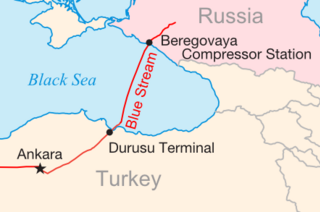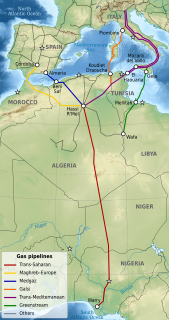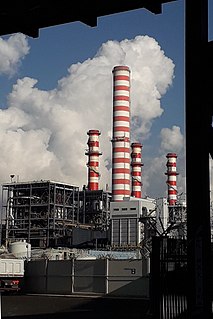
Sonatrach is the national state-owned oil company of Algeria. Founded in 1963, it is known today to be the largest company in Africa with 154 subsidiaries, and often referred as the first African oil "major". In 2021, Sonatrach was the seventh largest gas company in the world.

Eni S.p.A. is an Italian multinational oil and gas company headquartered in Rome. Considered one of the seven "supermajor" oil companies in the world, it has operations in 69 countries with a market capitalization of US$54.08 billion, as of 11 April 2022. The Italian government owns a 30.33% golden share in the company, 4.37% held through the Ministry of Economy and Finance and 25.96% through the Cassa Depositi e Prestiti. The company is a component of the Euro Stoxx 50 stock market index.

Blue Stream is a major trans-Black Sea gas pipeline that carries natural gas to Turkey from Russia. The pipeline has been constructed by the Blue Stream Pipeline B.V., the Netherlands based joint venture of Russian Gazprom and Italian Eni. The Blue Stream Pipeline B.V. is an owner of the subsea section of pipeline, including Beregovaya compressor station, while Gazprom owns and operates the Russian land section of the pipeline and the Turkish land section is owned and operated by the Turkish energy company BOTAŞ. According to Gazprom the pipeline was built with the intent of diversifying Russian gas delivery routes to Turkey and avoiding third countries.

The Trans Austria Gas (TAG) pipeline is a natural gas pipeline that leads from the Slovak-Austrian border at Baumgarten an der March to Arnoldstein in the south, near the border with Italy. Natural gas originating from Russia is transported to and used in Italy and Austria. In addition, it supplies Slovenia through the SOL Pipeline System, which branch-off at Weitendorf.

The Ünye–Ceyhan pipeline, commonly known with its former name, the Samsun–Ceyhan pipeline, was a planned crude oil pipeline traversing Turkey from the Black Sea to the Mediterranean oil terminal in Ceyhan. The aim of the project was to provide an alternative route for Russian and Kazakhstani oil and to ease the traffic burden in the Bosphorus and the Dardanelles. The project was halted in 2010. This was confirmed again in 2013.

Medgaz is a submarine natural gas pipeline between Algeria and Spain.

GALSI was a planned natural gas pipeline from Algeria to Sardinia and further northern Italy, as an extension to the TransMed Pipeline.

The Trans-Mediterranean Pipeline is a natural gas pipeline from Algeria via Tunisia to Sicily and thence to mainland Italy. An extension of the TransMed pipeline delivers Algerian gas to Slovenia.

The Maghreb–Europe Gas Pipeline is a natural gas pipeline, which links the Hassi R'Mel gas field in Algeria through Morocco with Cordoba in Andalusia, Spain, where it is connected with the Spanish and Portuguese gas grids. Before the operation of the pipeline ceased in October 2021, it used to supply mainly Spain and Portugal, as well as Morocco with natural gas.

Sino-Myanmar pipelines refers to the oil and natural gas pipelines linking Myanmar's deep-water port of Kyaukphyu (Sittwe) in the Bay of Bengal with Kunming in Yunnan province of China.

South Stream was a failed pipeline project to transport natural gas of the Russian Federation through the Black Sea to Bulgaria and through Serbia, Hungary and Slovenia further to Austria. It was never finished.
The Dolphin Gas Project is the natural gas project of Qatar, the United Arab Emirates, and Oman. It is the Gulf Cooperation Council's first cross-border refined gas transmission project and the largest energy-related venture ever undertaken in the region.
The Western Libyan Gas Project (WLGP) is a 50–50 joint venture between the Libyan National Oil Corporation (NOC) and the Italian company Eni which came online in October 2004. By July 2007, 280 billion cubic feet per year of natural gas was being exported from a processing facility at Melitah, on the Libyan coast, through the Greenstream pipeline to southeastern Sicily. From Sicily, the natural gas travels to the Italian mainland, and then onwards to the rest of Europe. WLGP is the first major project to valorize the natural gas produced in Libya through export to and marketing in Europe. WLGP is supplied from production at the Bahr Essalam and Wafa fields, which is processed at the onshore Mellitah treatment plant.

The Bouri Offshore Field is part of Block NC-41, which is located 120 kilometers (75 mi) north of the Libyan coast in the Mediterranean Sea. It was first discovered in 1976 at a depth of 8,700 feet (2,700 m) and is estimated to contain 4.5 billion barrels (720,000,000 m3) in proven recoverable crude oil reserves and 3.5 trillion cubic feet (99 km3) of associated natural gas with an annual production potential of 6 billion m³. Bouri is considered the largest producing oilfield in the Mediterranean.
Saipem S.p.A. is an Italian multinational oilfield services company and one of the largest in the world. Until 2016 it was a subsidiary of Italian oil and gas supermajor Eni, which retains approximately 30% of Saipem's shares.

Energy in Italy come mostly from fossil fuels. Among the most used resources are petroleum, natural gas, coal and renewables. Italy has few energy resources, and most of supplies are imported.

Energy in Algeria describes energy and electricity production, consumption and import in Algeria. Primary energy use in 2009 in Algeria was 462 TWh and 13 TWh per million persons. Algeria is an OPEC country.
The Interconnector Turkey–Greece–Italy (ITGI) natural gas pipeline is an incomplete transportation project that was proposed in the framework of the Southern Gas Corridor. It was proposed for the transportation of natural gas from Azerbaijan's Shah Deniz gas field Phase II to markets in Europe via Greece and Italy. The Turkey–Greece pipeline was completed in 2007 while the future of the Greece–Italy pipeline project is unclear due to the competing Trans Adriatic Pipeline.

Oil and gas each supply over a quarter of Turkey's primary energy. The country consumes 50 to 60 billion cubic metres of natural gas each year. Almost all oil and gas is imported and is a big part of the current account deficit of the economy, but a large gas field in the Black Sea is expected to start production in 2023.














